On this page:
- Bioinstrumentation Lab
- Ergonomics Lab
- Biomechanics and Tissue Engineering Lab
- Decision Analytics and Optimization Lab
- Human-Centric Lab
- Interactions, Design, Modeling Lab
- Nanomedicine Lab
- Neuro Engineering Rehabilitation and Degeneration Lab
- Smart Manufacturing Lab
- Tissue Culture Facility
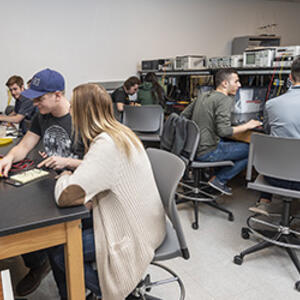
Bioinstrumentation Lab
Located in 203 Russ Engineering Center this multidisciplinary lab has students use a variety of instrumentation, test equipment, hardware, and software to perform experiments in electronics and biomedical engineering; including electronic circuit analysis, ECG generation and manipulation, various sensors such as strain gages, and a host of other BME-based lab activities.
Ergonomics Lab
Located in 448 Russ Engineering Center provides students studying ergonomics access to adjustable assembly space and engineering instruments to measure force and positions experienced by workers performing varying tasks.
Biomechanics and Tissue Engineering Lab
Located in 434 Neuroscience Engineering Collaboration building the Biomaterials and Biomechanics Lab is used by students to test materials. They determine how hard, strong, and tough the materials are to determine their applicability in the human body. Based on these mechanical properties one can use different materials for prosthetics and total joint replacements. Students also use microscopes to characterize what kind of damage implants undergo during the course of usage. We collect devices removed from revision surgery and bring them here so that students can determine how they suffer inside the human body. Graduate students then determine the causes of failure.
We also have computer simulation software used by students to build atoms together to know their behavior, to make 3D models of the implants, print them, and perform computer simulations as to how long they may last inside the body. Apart from these we have 3D body scanners and digitizing walk profiles to learn how humans walk and what kind of forces they generate.
Learn more about the Biomaterials and Biomechanics Lab (PDF)
Decision Analytics and Optimization Lab
Located in 256 Russ Engineering Center, the Decision Analytics and Optimization Lab provides a dedicated space for research and experimentation in data-driven decision-making, optimization, and machine learning techniques. The lab utilizes advanced computational tools, software, and algorithms to solve complex real-world problems across diverse domains, including military, energy, healthcare, logistics, transportation, and supply chain management.
Human-Centric Lab
The Human-Centric Lab located in 212 Russ Engineering Center aims to incorporate best human factor engineering practices into systems to enhance the well-being, safety, and performance of users. The application includes but is not limited to designing equipment, products, work systems, management systems, and tasks. Increased system availability, enhanced safety, and reduced lifetime costs will be the outcome of this.
Human-centred design, which is what the lab is known for, involves using human factors to design, which entails ensuring that a person, the task, the technology, and the environment are all well-matched. Both physical and cognitive specifications are considered by human factors engineering to ensure system safety. Our lab employs a range of tools and methods, including eye-tracking, EEG, brain imaging, simulation, and naturalistic observation, to examine behaviors and performances of pilots, drivers, healthcare workers, operators, and others.
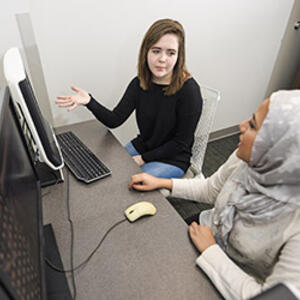
Interactions, Design, Modeling Lab
Located in 225 Russ Engineering Center with research focuses on core areas of cognitive modeling, decision-making, simulation and modeling, computational neuroscience, and human factors engineering. We conduct research in mobile computing, technologies for health and wellness, social networking, affective computing, design theory, and other related areas. Our work seeks to understand how technology can help enable more healthy, socially connected, reflective living.
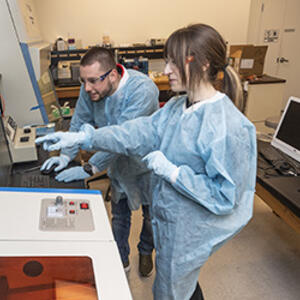
Nanomedicine Lab
Located in the 226 Russ Engineering Center includes equipment for producing nanostructured materials and characterizing their basic structural, chemical, and optical properties. In addition, synthesis methods based on solution-phase chemistry of nanostructured materials and nanoscale fabrication by self-assembly. It also supports infrastructure for microfabrication of PDMS-based microfluidics devices by a laser engraver and an oxygen plasma etcher/cleaner system, and bacterial cultures for developing biofilms.
Neuro Engineering Rehabilitation and Degeneration Lab
Located in the Neuroscience Engineering Collaboration (NEC) building, the multidisciplinary NERD lab has students from different backgrounds (engineering, neuroscience, biology) conducting a variety of biomedical experiments (computer modeling, electrophysiology, immunohistochemistry, behavioral) to study neurodegenerative diseases (e.g., amyotrophic lateral sclerosis, ALS, and frontotemporal dementia, FTD), aging, neuroprosthetics, and brain-machine interface.
Visit the Neuro Engineering Rehabilitation and Degeneration Lab
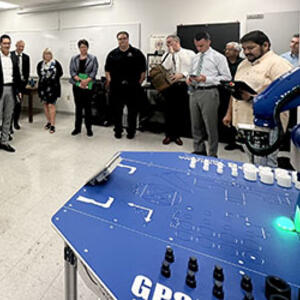
Smart Manufacturing Lab
Located in 220 Russ Engineering Center the GP8 Robot Cart features the same robot and equipment, including electric gripper and vision camera, that student will use in industry after graduation. It features the 6 axis Yaskawa GP8 robotic arm used in high speed assembly and material handling applications. The robot cart will be used to introduce students to Smart Manufacturing and give students hands-on experience with technology that will position them for an exciting career in engineering.
Baxter is helpful in understanding human machine teaming. It can take simple directions and place things like blocks or move items. It can be used in smart manufacturing.
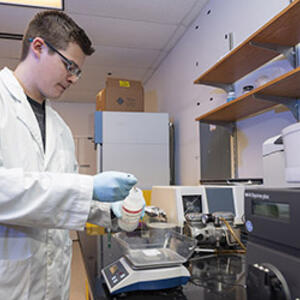
Tissue Culture Facility
Located in the 252 Russ Engineering Center supports research by providing space, equipment, cell cultures (mammalian), media, supplies, and training. The Facility also offers technical expertise and hands on support for custom research projects. Labs are equipped with laminar flow hoods, incubators, centrifuges, refrigerators/freezers, basic microscopes, and automated cell counters.